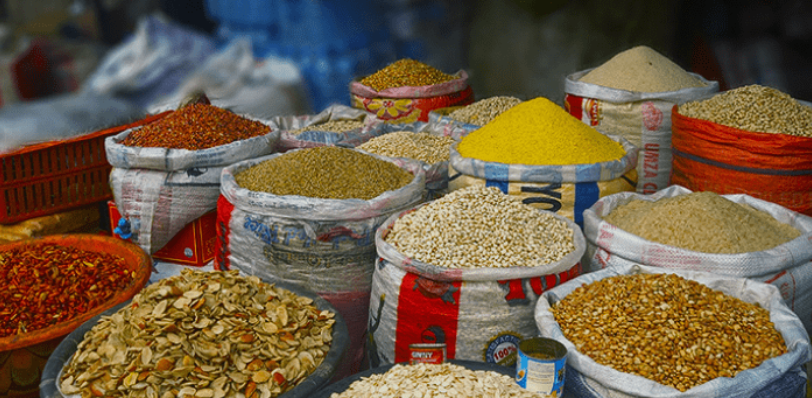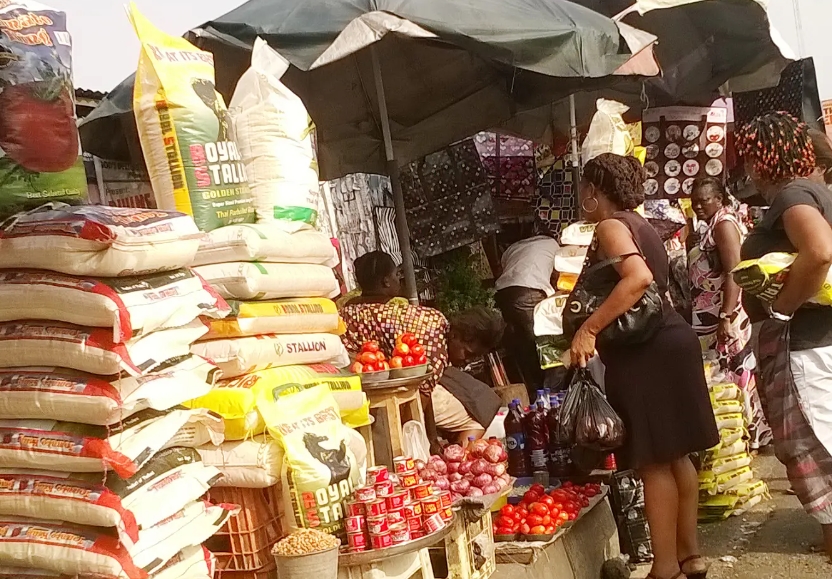The National Bureau of Statistics (NBS) said Nigeria’s headline inflation rate increased to 27.33 per cent in October 2023.
The NBS disclosed this in its Consumer Price Index (CPI) and Inflation Report for October, which was released in Abuja on Wednesday.
According to the report, the figure, which is 0.61 per cent points higher compared to 26.72 per cent recorded in September 2023.
It said on a year-on-year basis, the headline inflation rate in October was 6.24 per cent higher than the rate recorded in October 2022 at 21.09 per cent.
The report said the increase in the headline index for October 2023 on a year on year basis was attributed to the increase in some items in the basket of goods and services at the divisional level.
It said these increases were observed in food and non-alcoholic beverages at 14.16 per cent and housing, water, electricity, gas, and other fuel at 4.57 per cent.
Others were clothing and footwear at 2.09 per cent; transport at 1.78 per cent; furnishings, household equipment and maintenance at 1.37 per cent, education at 1.08 per cent, and health at 0.82 per cent.
It added, “Miscellaneous goods and services at 0.45 per cent; restaurant and hotels at 0.33 per cent; alcoholic beverage, tobacco and kola at 0.30 per cent; recreation and culture at 0.19 per cent, and communication at 0.19 per cent.”
In addition, the report said, on a month-on-month basis, the headline inflation rate in October 2023 was 1.73 per cent, which was 0.37 per cent lower than the rate recorded in September 2023 at 2.10 per cent.
It said, ” This means that in October 2023, the rate of increase in the average price level is less than the rate of increase in the average price level in September 2023.
It said the percentage change in the average CPI for the 12 months ending October 2023 over the average of the CPI for the previous corresponding 12-month period was 23.44 per cent.
“This indicates a 5.57 per cent increase compared to 17.86 per cent recorded in October 2022.”
The report said the food inflation rate in October increased to 31.52 per cent on a year-on-year basis, which was 7.80 per cent higher compared to the rate recorded in October 2022 at 23.72 per cent.
It added, “The rise in food inflation on a year on year basis is caused by increases in prices of oil and fats, bread and cereals, fish, potatoes, yams and other tubers, fruits, meat, vegetable, milk, cheese and eggs. ”
It said on a month-on-month basis, the food inflation rate in October was 1.91per cent, which was a 0.54 per cent drop compared to the rate recorded in September 2023 at 2.45 per cent.“
The report added, “The decline in food inflation on a month-on-month basis was caused by a decrease in the average prices of fruits, oil and fats, coffee, tea and cocoa, bread and cereals. ”
It said the “All items less farm produce and energy’’ or core inflation, which excluded the prices of volatile agricultural produce and energy, stood at 22.58 per cent in October on a year-on-year basis.
“This increased by 5.12 per cent compared to 17.46 per cent recorded in October 2022.
“The exclusion of the PMS is due to the deregulation of the commodity by removal of subsidy,” the report continued.
It said the highest increases were recorded in prices of passenger transport by road, medical services, passenger transport by air, actual and imputed rentals for housing, pharmaceutical products etc.
The NBS said on a month-on-month basis, the core inflation rate was 1.39 per cent in October 2023.
The report added, “This indicates a 0.83 per cent drop compared to what was recorded in September 2023 at 2.22 per cent.
“The average 12-month annual inflation rate was 19.98 per cent for the 12 months ending October 2023, this was 4.60 per cent points higher than the 15.38 per cent recorded in October 2022.”
The report said on a year-on-year basis in October, the urban inflation rate was 29.29 per cent, which was 7.66 per cent higher compared to the 21.63 per cent recorded in October 2022.
It said, “On a month-on-month basis, the urban inflation rate was 1.81 per cent in October representing a 0.43 per cent decline compared to September 2023 at 2.24 per cent.
The report said on a year-on-year basis in October, the rural inflation rate was 25.58 per cent, which was 5.01 per cent higher compared to the 20.57 per cent recorded in October 2022.
“On a month-on-month basis, the rural inflation rate was 1.67 per cent, which decreased by 0.29 per cent compared to September 2023 at 1.96 per cent.’’
On states’ profile analysis, the report showed in October, all items inflation rate on a year-on-year basis was highest in Kogi at 34.20 per cent, followed by Rivers at 31.44 per cent, and Lagos at 31.33 per cent.
It, however, said the slowest rise in headline inflation on a year-on-year basis was recorded in Borno at 20.06 per cent, followed by Jigawa at 23.52 per cent, and Sokoto at 24.47 per cent.
The report, however, said in October 2023, all items inflation rate on a month-on-month basis was highest in Yobe at 3.72 per cent, Jigawa at 2.85 per cent, and Sokoto at 2.84 per cent.
“Kogi at 1.01 per cent, followed by Edo at 1.05 per cent and Kwara at 1.18 per cent recorded the slowest rise in month-on-month inflation.”
The report said on a year-on-year basis, food inflation was highest in Kogi at 41.74 per cent, followed by Kwara at 38.48 per cent, and Lagos at 37.37 per cent.
“Borno at 24.41 per cent, followed by Kebbi at 24.90 per cent and Jigawa at 25.10 per cent recorded the slowest rise in food inflation on a year-on-year basis,”it added.
The report, however, said on a month-on-month basis, food inflation was highest in Yobe at 5.35 per cent, followed by Sokoto at 3.68 per cent and Jigawa at 3.45 per cent.
It said, “With Edo at 0.95 per cent, followed by Katsina at 1.03 per cent and Rivers at 1.10 per cent recorded the slowest rise on month-on-month food inflation.’’







